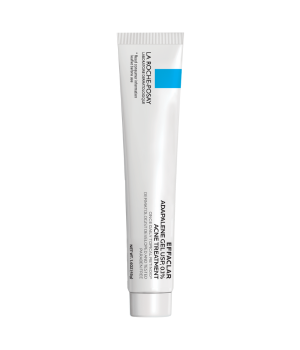Adapalene
TYPE OF INGREDIENT
Retinoid
COMMONLY FOUND IN
Acne treatments, anti-aging creams
WHAT ARE THE BENEFITS OF ADAPALENE?
Adapalene functions at the cellular level to increase turnover of epithelial cells in the skin and help exfoliate dead skin cells.
WHAT IS ADAPALENE?
Adapalene is a synthetic retinoid. Retinoids are among the most effective acne treatments, but also have additional effects to reduce photoaging and wrinkles. Adapalene is selective for the RAR-beta and gamma receptors, and is generally less irritating when applied to the skin in comparison with stronger retinoids, such as tretinoin or trifarotene. Adapalene is available over the counter in 0.1% strength and as a prescription at 0.3%, as well as in combination creams with other acne medications, such as benzoyl peroxide and clindamycin.
IS ADAPALENE SAFE FOR ALL SKIN TYPES AND TONES?
Retinoids are safe in all types of skin, however patients should be counseled on likely effects of irritation, dryness and peeling. Often patients using retinoids for the first time may experience a temporary “purging” period during the first few weeks of treatment. Patients should be counseled that retinoids are effective in the long-term and that they should continue treatment for a minimum of three months to assess efficacy.
CONTRAINDICATIONS
Retinoids including adapalene are contraindicated for those who are pregnant or nursing. Although few well-controlled studies exist regarding the risk of topical retinoids, these guidelines are based on well-documented evidence of birth defects from systemic retinoids such as isotretinoin.
Sources:
Motamedi M, Chehade A, Sanghera R, Grewal P. A Clinician’s Guide to Topical Retinoids. Journal of Cutaneous Medicine and Surgery. 2022;26(1):71-78.
Thielitz A., Abdel-Naser MB., Fluhr JW., Zouboulis CC., Gollnick H. Topical retinoids in acne – an evidence-based overview. J Dtsch Dermatol Ges. 2008;6(12):1023-1031.
Riahi RR., Bush AE., Cohen PR. Topical retinoids: therapeutic mechanisms in the treatment of photodamaged skin. Am J Clin Dermatol. 2016;17(3):265-276.


